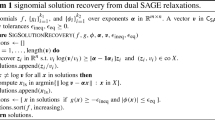Abstract
This paper derives new algorithms for signomial programming, a generalization of geometric programming. The algorithms are based on a generic principle for optimization called the MM algorithm. In this setting, one can apply the geometric-arithmetic mean inequality and a supporting hyperplane inequality to create a surrogate function with parameters separated. Thus, unconstrained signomial programming reduces to a sequence of one-dimensional minimization problems. Simple examples demonstrate that the MM algorithm derived can converge to a boundary point or to one point of a continuum of minimum points. Conditions under which the minimum point is unique or occurs in the interior of parameter space are proved for geometric programming. Convergence to an interior point occurs at a linear rate. Finally, the MM framework easily accommodates equality and inequality constraints of signomial type. For the most important special case, constrained quadratic programming, the MM algorithm involves very simple updates.

Similar content being viewed by others
References
Bertsekas, D.P.: Nonlinear Programming. Athena Scientific (1999)
Borwein, J.M., Lewis, A.S.: Convex Analysis and Nonlinear Optimization: Theory and Examples. Springer, New York (2000)
Boyd, S., Kim, S.J., Vandenberghe, L., Hassibi, A.: A tutorial on geometric programming. Optim. Eng. 8, 67–127 (2007)
Boyd, S., Vandenberghe, L.: Convex Optimization. Cambridge University Press, Cambridge (2004)
del Mar Hershenson, M., Boyd, S.P., Lee, T.H.: Optimal design of a CMOS op-amp via geometric programming. IEEE Trans Comput. Aided Des. 20, 1–21 (2001)
Ecker, J.G.: Geometric programming: methods, computations and applications. SIAM Rev. 22, 338–362 (1980)
Feigin, P.D., Passy, U.: The geometric programming dual to the extinction probability problem in simple branching processes. Ann. Prob. 9, 498–503 (1981)
Hoffman, K.: Analysis in Euclidean Space. Prentice-Hall, Englewood Cliffs (1975)
Hunter, D.R., Lange, K.: A tutorial on MM algorithms. Am. Stat. 58, 30–37 (2004)
Lange, K.: Optimization. Springer, New York (2004)
Lange, K., Hunter, D.R., Yang, I.: Optimization transfer using surrogate objective functions (with discussion). J Comput Graph. Stat. 9, 1–59 (2000)
Mazumdar, M., Jefferson, T.R.: Maximum likelihood estimates for multinomial probabilities via geometric programming. Biometrika 70, 257–261 (1983)
Nocedal, J., Wright, S.J.: Numer. Optim. Springer, Berlin (1999)
Passy, U., Wilde, D.J.: A geometric programming algorithm for solving chemical equilibrium problems. SIAM J Appl Math. 16, 363–373 (1968)
Peressini, A.L., Sullivan, F.E., Uhl, J.J. Jr.: The Mathematics of Nonlinear Programming. Springer, New York (1988)
Peterson, E.L.: Geometric programming. SIAM Rev. 18, 338–362 (1976)
Ruszczynski, A.: Optimization. Princeton University Press, Princeton (2006)
Sha, F., Saul, L.K., Lee, D.D.: Multiplicative updates for nonnegative quadratic programming in support vector machines. In: Becker, S., Thrun, S., Obermayer, K. (eds.) Advances in Neural Information Processing Systems, vol. 15, pp. 1065–1073. MIT Press, Cambridge
Steele, J.M.: The Cauchy-Schwarz Master Class: An Introduction to the Art of Inequalities. Cambridge University Press and the Mathematical Association of America, Cambridge (2004)
Wang, Y., Zhang, K., Shen, P.: A new type of condensation curvilinear path algorithm for unconstrained generalized geometric programming. Math. Comput. Model. 35, 1209–1219 (2002)
Zhou, H., Alexander, D., Lange, K.L.: A quasi-Newton acceleration method for high-dimensional optimization algorithms. Stat. Comput. 21, 173–261 (2011)
Zhou, H., Lange, K.L.: MM algorithms for some discrete multivariate distributions. J. Comput. Graph. Stat 19(3), 645–665 (2010)
Zhou, H., Lange, K.L.: A fast procedure for calculating importance weights in bootstrap sampling. Comput. Stat. Data Anal. 55, 26–33 (2011)
Zhou, H., Lange, K.L.: Path following in the exact penalty method of convex programming. arXiv:1201.3593 (2011)
Zhou, H., Lange, K.L., Suchard, M.A.: Graphical processing units and high-dimensional optimization. Stat. Sci. 25(3), 311–324 (2010)
Author information
Authors and Affiliations
Corresponding author
Additional information
Research was supported by United States Public Health Service grants GM53275, MH59490, and R01HG006139.
Rights and permissions
About this article
Cite this article
Lange, K., Zhou, H. MM algorithms for geometric and signomial programming. Math. Program. 143, 339–356 (2014). https://doi.org/10.1007/s10107-012-0612-1
Received:
Accepted:
Published:
Issue Date:
DOI: https://doi.org/10.1007/s10107-012-0612-1
Keywords
- Arithmetic-geometric mean inequality
- Geometric programming
- Global convergence
- MM algorithm
- Linearly constrained quadratic programming
- Parameter separation
- Penalty method
- Signomial programming




